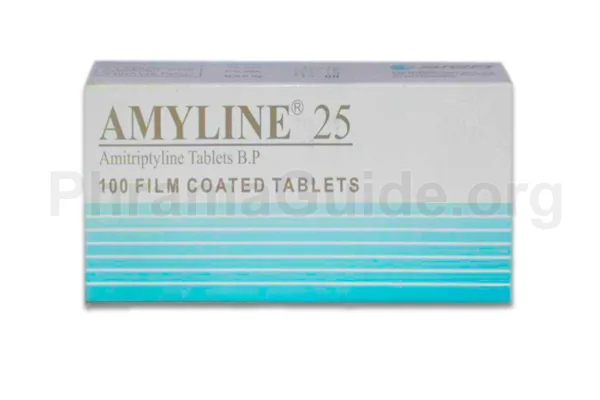Amyline tablet is primarily used for the treatment of anxiety and depression. It belongs to the class of drugs known as tricyclic antidepressants (TCAs). Following are some common uses of Amyline Tablet:
- Depression: Amyline tablet is an antidepressant and is often used for the treatment of major depressive disorder. It helps to improve mood, reduce feelings of sadness, and increase energy levels.
- Anxiety Disorders: Amyline tablet is sometimes used to treat anxiety disorders such as generalized anxiety disorder (GAD) and panic disorder. It can help reduce anxiety symptoms and promote a sense of calmness.
- Neuropathic Pain: Amyline tablet is also effective in treating certain types of chronic pain, particularly neuropathic pain. It can help alleviate pain caused by conditions such as diabetic neuropathy, postherpetic neuralgia (nerve pain following shingles), and fibromyalgia.
- Migraine Prevention: Amyline tablet is commonly used as a preventive medication for migraines. It can help reduce the frequency and intensity of migraine headaches.
- Insomnia: Due to sedative properties, Amyline tablet is sometimes used to treat insomnia. It can help promote sleep and improve sleep quality.
- Irritable Bowel Syndrome (IBS): In some cases, Amyline tablets may be used for the management of symptoms related to irritable bowel syndromes, such as abdominal pain, bloating, and diarrhea.
Off-label Uses of Amyline Tablet
- Chronic Pain: Apart from neuropathic pain, Amyline tablets may be used off-label to manage other types of chronic pain, such as chronic back pain, chronic headache, and musculoskeletal pain.
- Post-Traumatic Stress Disorder (PTSD): Amyline tablets may be used off-label for individuals with PTSD who experience symptoms such as anxiety, depression, and insomnia.
- Obsessive-Compulsive Disorder (OCD): In some cases, Amyline tablets may be used off-label as an adjunctive treatment for OCD when other medications or therapies have been ineffective.
- Bipolar Disorder: Amyline tablets can also used as an adjunctive treatment for bipolar disorder, particularly during depressive episodes.
- Chronic Fatigue Syndrome (CFS): Some healthcare providers may use Amyline tablet to manage symptoms associated with chronic fatigue syndromes, such as sleep disturbances, pain, and depression.

What is Amyline?
Amyline is one of the leading brands of Amitriptyline, manufactured and marketed by Siza International (Pvt) Ltd, Pakistan.
Amyline Alternatives : Other Similar Brands
The following are some alternative brands of Amyline and their manufacturers.
- Tryptanol : OBS Pharma, Pakistan.
- Amitin : Glitz Pharma, Pakistan.
- Amotrip : Pharmedic (Pvt) Ltd, Pakistan.
- Nortensil : Specific Research Laboratories, Pakistan.
- Amitryp : Dr. Raza Pharma (Pvt) Ltd, Pakistan.
- Ready : Xenon Pharmaceuticals (Pvt) Ltd, Pakistan.
- Triptylin : Caraway Pharmaceuticals, Pakistan.
Amyline : Available Formulations and Strengths
Presently, Amyline is available in Tablet Form with the following strength.
Amyline Tablet : 25mg strength.
Who Should Not Use Amyline?
Amyline has certain contraindications, which are situations or conditions in which the use of Amyline is not recommended due to the potential risks outweighing the benefits.
Hypersensitivity: Amyline should not be used in individuals who have a known hypersensitivity or allergy to the medication or any of its components. Allergic reactions can range from mild skin reactions to severe anaphylaxis, a life-threatening allergic response.
Recent myocardial infarction (heart attack): Amyline is contraindicated in individuals who have had a recent heart attack. It can interfere with the healing process of the heart and may increase the risk of arrhythmias (abnormal heart rhythms) and other cardiac complications.
Concurrent use of monoamine oxidase inhibitors (MAOIs): Combining Amyline with MAOIs or using Amyline within 14 days of discontinuing an MAOI is contraindicated. This combination can lead to a potentially life-threatening condition called serotonin syndrome, characterized by symptoms such as agitation, rapid heartbeat, high blood pressure, tremors, and fever.
Acute recovery phase after myocardial infarction: Amyline is generally contraindicated in individuals in the acute recovery phase following a heart attack, as it may increase the risk of complications and cardiac arrhythmias.
Narrow-angle glaucoma: Amyline should be avoided in individuals with narrow-angle glaucoma, a type of glaucoma characterized by increased eye pressure. The medication can further increase intraocular pressure, leading to a worsening of the condition.
Urinary retention: Amyline may exacerbate urinary retention, a condition in which emptying the bladder is impaired. It should be used with caution or avoided in individuals with urinary retention or bladder outlet obstruction.
Pregnancy and breast-feeding: The use of Amyline during pregnancy and breastfeeding should be carefully considered, as it may pose risks to the developing fetus or the nursing infant. The potential benefits and risks should be evaluated by a healthcare professional.
What is the Recommended Daily Dosage of Amyline?
Amyline Dose for Depression:
- Initial dose: 1 to 2 Tablets of 25mg per day, taken in divided doses (usually at bedtime initially).
- Maintenance dose: The dose may be increased gradually over time, usually up to a maximum of Three tablets of 25mg per day, although some individuals may require higher doses.
- The daily dose may be taken as a single dose at bedtime or divided into two to four smaller doses throughout the day.
Amyline Dose for Neuropathic Pain and Migraine Prevention:
- Initial dose: One tablet of 25mg per day, taken at bedtime.
- Maintenance dose: The dose may be gradually increased as needed, up to a maximum of three tablets of 25mg per day.
- The daily dose may be taken as a single dose at bedtime or divided into two to three smaller doses throughout the day.
How Amyline Works?
- Amyline works by inhibiting the reuptake of the neurotransmitters serotonin and norepinephrine. By blocking the reuptake process, more serotonin and norepinephrine are available in the synaptic space between nerve cells, enhancing their effects on mood regulation and nerve signal transmission.
- Amyline has antihistaminic properties and blocks histamine H1 receptors. This can contribute to its sedative effects and may help with sleep disturbances.
- Amyline also blocks certain alpha-adrenergic receptors, which can lead to sedation and orthostatic hypotension (a drop in blood pressure upon standing).

Leave A Comment